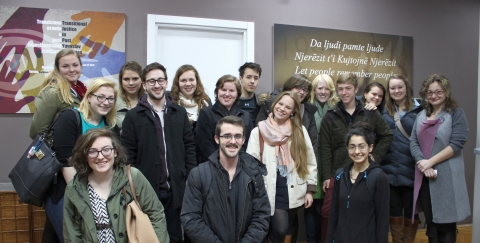(srpski) Ustavni sud Srbije u predmetu “Ovčara” – zabrinjavajući presedan

Sorry, this entry is only available in srpski.


Sorry, this entry is only available in srpski.

 On 12th March 2014, the Coalition for Access to Justice invited Pablo de Greiff, the United Nations Special Rapporteur on the promotion of truth, justice, reparation and guarantees of non-recurrence, to visit Serbia, in order to make recommendations to the Government of Serbia regarding the measures which will help achieve justice for victims of crimes and other gross human rights violations committed during the 1990s in the former Yugoslavia.
On 12th March 2014, the Coalition for Access to Justice invited Pablo de Greiff, the United Nations Special Rapporteur on the promotion of truth, justice, reparation and guarantees of non-recurrence, to visit Serbia, in order to make recommendations to the Government of Serbia regarding the measures which will help achieve justice for victims of crimes and other gross human rights violations committed during the 1990s in the former Yugoslavia.

 Almost everything is known about the Yugoslav People’s Army (JNA) camps for Croats set up in the territory of Serbia after the fall of Vukovar in the autumn of 1991. Civilians were taken to them from the area of Vukovar in contravention of an agreement reached between the JNA and the Croatian side. There were women and children among the detainees. Some 5,000 or so detainees were subjected to daily torture, including humiliation, starvation and inhuman conditions. These facilities were referred to as ‘camps’ even by JNA officers.
Almost everything is known about the Yugoslav People’s Army (JNA) camps for Croats set up in the territory of Serbia after the fall of Vukovar in the autumn of 1991. Civilians were taken to them from the area of Vukovar in contravention of an agreement reached between the JNA and the Croatian side. There were women and children among the detainees. Some 5,000 or so detainees were subjected to daily torture, including humiliation, starvation and inhuman conditions. These facilities were referred to as ‘camps’ even by JNA officers.

At the end of February 2014, the Humanitarian Law Center (HLC) was informed that the Ombudsman, the Office for Human and Minority Rights of the Government of Serbia (Office for Human Rights) and the Commissioner for the Protection of Equality (Commissioner) had given up on the initiative for the passing of the new Law on Civilian Victims of War, which would acknowledge the rights of all the citizens of Serbia who have been victims of war crimes and other serious violations of human rights related to the wars of the 1990s. The HLC points out that denying the status of civilian victims to numerous categories has all the characteristics of a systematic violation of human rights, and further, that the state’s treatment of these individuals is unprecedented in the former Yugoslav region.

 The HLC has launched a number of activities by which it seeks to advance the process of dealing with past crimes in the context of the EU integration. Given the fact that the processes of dealing with the past have been pushed aside for years by Serbian institutions, the upcoming EU accession process represents a unique opportunity for putting the issue of the responsibility for war crimes on the agenda and incorporating transitional justice standards in the legal and institutional framework of the Republic of Serbia.
The HLC has launched a number of activities by which it seeks to advance the process of dealing with past crimes in the context of the EU integration. Given the fact that the processes of dealing with the past have been pushed aside for years by Serbian institutions, the upcoming EU accession process represents a unique opportunity for putting the issue of the responsibility for war crimes on the agenda and incorporating transitional justice standards in the legal and institutional framework of the Republic of Serbia.
The newsletter wishes to underline how important it is for a country aspiring to join the community of European nations, but also for the EU itself, to initiate the process of dealing with the past. History has shown that unresolved issues of the past are always present, hampering the functioning of a political system, be it a state or a community of states. Therefore, both the Republic of Serbia and the EU Members States have an obligation to secure a stable political and legal system for their citizens, a system governed by the rule of law, which will guarantee the protection of and respects for human rights of its citizens.
You can send us your comments on the newsletter at: towardsJUSTICE@hlc-rdc.org and join the discussion at Twitter/#towardsJUSTICE.
Download first issue of the newsletter here.

On Wednesday, 26th February 2014, a group of students at the School for International Training (SIT) paid a visit to the Humanitarian Law Center (HLC). The students, who attend various universities in the United States, will spend 15 weeks in Serbia at the Faculty of Media and Communications Center for Comparative Conflict Studies, under the SIT’s Peace and Conflict Studies Program.

 A new project aims to create a comprehensive database of all the prison camps and other wartime detention facilities across the country over the next five years.
A new project aims to create a comprehensive database of all the prison camps and other wartime detention facilities across the country over the next five years.

On Thursday, 27th February 2014, it will be twenty-one years since the crime at Štrpci (BiH), where members of the Army of the Republic of Srpska (VRS) abducted 19 Bosniak civilians – citizens of the then Federal Republic of Yugoslavia – from a train travelling from Belgrade to Bar and subsequently killed them. Women in Black, the Youth Initiative for Human Rights and the Humanitarian Law Center (HLC) reiterate that the responsibility for this crime lies with the institutions of the Republic of Serbia and condemn their present-day shameful treatment of victims of this crime by refusing to recognize them as civilian victims of war.